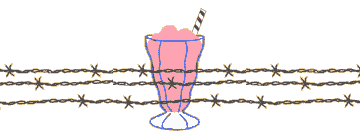Privatization
The most radical, and often most useful, solution to the tragedy of the commons is to split up the commons. What happened in medieval villages across Europe was that grazing commons got split up and fenced off. On the one hand, this caused great hardship for those who were not lucky (read: rich) enough to get a share. On the other hand, it probably also averted land degradation, because no individual has an interest in exploiting his own land to the point of tragedy.

Here's another example of privatization, one that people who grew up in a large family will immediately identify with (sorry, all you singletons...). Put a chocolate milkshake and 4 straws in the middle of a group of 4 siblings and what happens? The milkshake is a commons, and each kid tries to exploit it as fast as possible, even if that means ending up with a stomach-ache -- get as much as possible before it runs out. Any kid who waits will end up with nothing.
On the other hand, if you get 4 dixie cups and divide up the milkshake, now each kid has her own. She can drink fast or slow or even keep it in the freezer without fear of missing out.

"An alternative to the commons need not be perfectly just to be preferable... Injustice is preferable to total ruin."
Yes, there are problems with privatization, most notably with deciding how to divide up a resource -- Who gets what? Should it be based on how much a person was using before? On how much they need? On how rich / powerful they are? Clearly there is a political process of winners and losers, and it is very possible that the most disadvantaged people will end up with little or nothing. HOWEVER, privatization can also be carried out fairly, and Hardin argues that even partial fairness is better than the alternative -- complete destruction of the resource.
Copyright University of Maryland, 2007
You may link to this site for educational purposes.
Please do not copy without permission
requests/questions/feedback email: mathbench@umd.edu